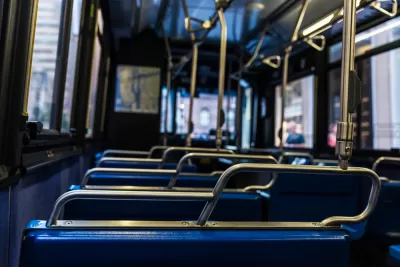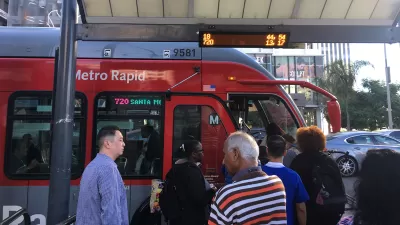“The biggest US transit agencies must be allowed to simply focus on delivering high-quality service. There is no Plan B.”

An article by David Zipper for Vox provides one of the most detailed accounts yet of the crisis facing public transit because of reduced ridership and revenues coming out of the pandemic. “Few parts of the American economy were upended by Covid as much as public transportation,” according to Zipper. As a result, the current crisis has the “potential to decimate their service, cripple local economies, and diminish quality of life.”
To escape the crisis, Zipper writes that “transit leaders must offer a full-throated defense of their essential role in American life. They must then secure new and reliable revenue streams from state and regional sources, which will require convincing residents and legislators that transit is worthy of subsidy — not an easy thing to do in a country where the vast majority of people don’t ride the bus or train.”
“The only realistic way for transit officials to garner public support for the funding they desperately need is to demonstrate an ability to replace car trips, not just serve economically disadvantaged people who lack other means to get around their city,” adds Zipper. The pro-transit arguments that resonate most with the public, according to Zipper’s argument, are “curtailing congestion, reducing auto emissions, and boosting economic growth.”
The potential for transit trips to replace car trips cannot be achieved by fare-free transit programs nor other “distractions” such as electric buses. In fact, Zipper argues that transit agencies must be encouraged to redistribute funds intended for large capital investments, such as new rail lines and new buses, to programs that increase service with existing resources.
Key to the argument is an effort to dispel the notion of fare-free transit as a solution for the current, post-pandemic era. Eliminating fares sends transit in the wrong direction, according to Zipper, by requiring “transit systems to find even more outside funding to be able to function, making it harder to provide high-quality service.” Zipper isn’t the first to argue that free fares are a setback rather than a boon for public transit—an article by Jerusalem Demsas in 2022 and an article by Steven Polzin in 2018 made the same arguments.
Instead of increasing the costs of transit, agencies and their partners at various levels of government should be focused on “establishing recurring sources of funding,” according to Zipper, such as, for example, New York City’s congestion pricing plan, “which will charge motorists up to $23 to enter Manhattan’s central business district and add around $1 billion annually to MTA’s capital budget….”
A lot more detail on how transit arrived at this crisis (with a history that dates well back into the 20th century) and more nuance on Zipper’s arguments are available to read in full at the link below.
FULL STORY: How to save America’s public transit systems from a doom spiral

Maui's Vacation Rental Debate Turns Ugly
Verbal attacks, misinformation campaigns and fistfights plague a high-stakes debate to convert thousands of vacation rentals into long-term housing.

Planetizen Federal Action Tracker
A weekly monitor of how Trump’s orders and actions are impacting planners and planning in America.

In Urban Planning, AI Prompting Could be the New Design Thinking
Creativity has long been key to great urban design. What if we see AI as our new creative partner?

King County Supportive Housing Program Offers Hope for Unhoused Residents
The county is taking a ‘Housing First’ approach that prioritizes getting people into housing, then offering wraparound supportive services.

Researchers Use AI to Get Clearer Picture of US Housing
Analysts are using artificial intelligence to supercharge their research by allowing them to comb through data faster. Though these AI tools can be error prone, they save time and housing researchers are optimistic about the future.

Making Shared Micromobility More Inclusive
Cities and shared mobility system operators can do more to include people with disabilities in planning and operations, per a new report.
Urban Design for Planners 1: Software Tools
This six-course series explores essential urban design concepts using open source software and equips planners with the tools they need to participate fully in the urban design process.
Planning for Universal Design
Learn the tools for implementing Universal Design in planning regulations.
planning NEXT
Appalachian Highlands Housing Partners
Mpact (founded as Rail~Volution)
City of Camden Redevelopment Agency
City of Astoria
City of Portland
City of Laramie





























